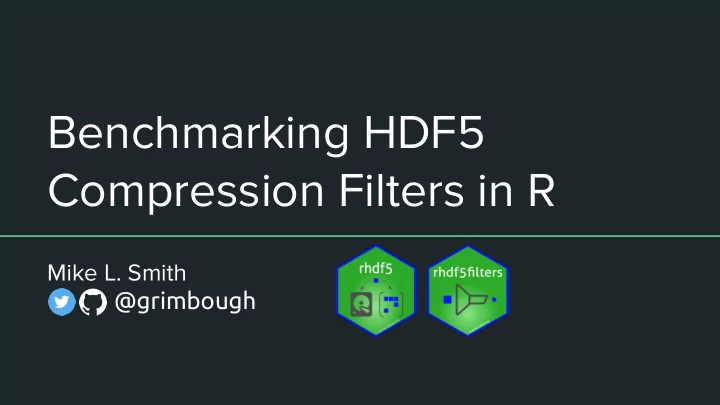

Benchmarking HDF5 Compression Filters in R Mike L. Smith @grimbough
HDF5 is a file format for storing large, heterogenous, data ● Used in a variety of software, e.g: DelayedArray ○ ○ Kallisto ONT sequencing ○ ○ mz5 mass spec file Interfaces in many languages ● ○ C, Python, … ○ rhdf5 & Rhdf5lib ● Key features: ○ Hierarchical Self describing ○ ○ Efficient subsetting Compressed ○ http://neondataskills.org/HDF5/About
HDF5 datasets are not contiguous, but stored in chunks
HDF5 datasets are not contiguous, but stored in chunks
Chunks are stored separately on disk
Only read the chunks needed for a subset
Chunks can be processed by filters - usually for compression Writing GZIP Shuffle Compress In Memory On Disk Data Storage Chunk GZIP Unshuffle Decompress Reading
There are a number of compression filters available ● Internal filters ○ HDF5 ships with support for GZIP and SZIP Dynamic filters ● ○ Third party tools can be made available at runtime ○ Wrap existing compression tool in small amount of C code Provide location to HDF5 and they are loaded when required ○ ○ Independent of the application(s) using them
rhdf5filters provides additional filters in R ● BLOSC meta compressor ● BZIP2 ● Compiles C code on all platforms, including Windows ● Integrated with rhdf5 ○ Writing: Supply argument to function ○ Reading: Used automatically if needed msmith.de/rhdf5filters/ ●
Filters & parameters have been benchmarked Reading Time Writing Time File Size
You can explore the results with a shiny app msmith.de/rhdf5filters-benchmarks ● ● Scripts to run benchmarks also available Grateful for any contributions on ● both style and substance!
Thanks to EMBL Huber Lab & BioC community! msmith.de/rhdf5filters-benchmarks @grimbough
Recommend
More recommend